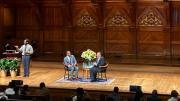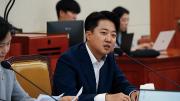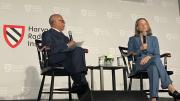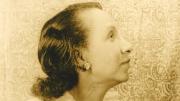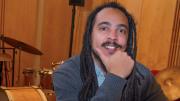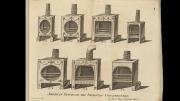During a conversation Thursday evening in Sanders Theatre that ranged from memories of civil rights marches to police violence and current political battles over the teaching of black history, the subject that civil rights activist Martin Luther King III kept coming back to was love: the love that his parents, Martin Luther King, Jr. and Coretta Scott King, had for each other and for their four children, the love they brought to their activism, and the love that fueled the idea of a “beloved community,” free from what the civil rights leader had termed the “triple evils” of poverty, racism, and violence. “Darkness can’t put out darkness,” King said, echoing his father’s words. “Violence will not end violence. You may win a day and you can win a battle, but in terms of sustainable systems, it’s not going to happen. Only love can do that.”
In an event sponsored by the Faculty of Arts and Sciences Office for Equity, Diversity, Inclusion, and Belonging, King spoke with Loeb associate professor of the social sciences Brandon Terry, a scholar of African American political thought who has studied Martin Luther King, Jr.’s work in particular depth. In 2018, Terry edited Fifty Years Since MLK and co-edited (with Titcomb professor of African and African American studies and of philosophy Tommie Shelby) To Shape a New World: Essays on the Political Philosophy of Martin Luther King, Jr.
Their conversation occurred on the heels of two sharply divergent events: on January 14, “The Embrace,” a 20-foot-tall sculpture was unveiled in Boston Common. Created by artist Hank Willis Thomas, it was inspired by a photograph of King and his wife hugging after he won the Nobel Peace Prize in 1964. Two weeks after the unveiling, Memphis officials announced murder charges against five police officers and released a video showing the killing of Tyre Nichols, a 29-year-old black man, during a traffic stop. Calling Nichols’s death “beyond tragic” and advocating changes in the culture of police departments and the establishment of independent civilian review boards to bring accountability to police, King asked: “How many days does that happen and we don’t see it? That’s the question.”
Drawing connections between the past and present-day struggles for racial equality, the conversation also included some of Martin Luther King III’s earliest memories. “In our home, there were interruptions on a consistent basis,” he recalled, “but consciously I didn’t know that, because my mom and dad did all they could to ensure that our environment was not just safe, but that it was normal.” He spoke of the frequent and famous guests his father brought home—John Lewis [LL.D. ’12], Julian Bond, Harry Belafonte, and Stokely Carmichael—and of the threatening phone calls that also arrived. He recalled the day his father was assassinated in 1968, and how his mother had rushed to the Atlanta airport to fly to Memphis to be with him, only to turn around at the gate and come home to her children when she received the news that her husband had died. “I felt as if it was a very bad dream,” said King, who was 10 when his father was killed. He spoke of his mother’s role in the postwar peace movement and her work as an organizer for labor rights, activism on behalf of the LGBTQ community, and lifelong effort, beginning within days of her husband’s death, to carry on his civil rights work.
In a long back-and-forth, King and Terry dissected the agape love his father preached from the pulpit and adopted as a core of his political philosophy. Terry talked about a course he regularly teaches, “Martin Luther King, Jr. and the Question of Conscientious Citizenship,” and said that he often hears skepticism from students about whether there’s a place for love in politics—whether it can “endure the opposition and anger and violence sent back against it.” In response, King said, “We don’t function at our best in anger,” even when it’s legitimate. He spoke of other family members he’d lost to violence: an uncle who “mysteriously drowned” the year after his father’s killing, his paternal grandmother shot and killed at church a few years later by a Black Hebrew Israelite. “I’m so thankful for the example and the spirit of love. My granddad used to say, ‘I refuse to allow a man to reduce me to hatred.’”
Later, King and Terry turned to the political fights over public education and the teaching of African American history, particularly in Florida under Governor Ron DeSantis, J.D. ’05. “I’ve been thinking a lot about the critical race theory controversy,” Terry said. “It’s a terrifying time to be somebody who’s a professor of African American studies, somebody who teaches critical theory. You wake up and your book is banned in 24 states. That’s a real thing that’s happening. People can lose their job for teaching a book that I write. What do we do in the face of that onslaught?”
King offered solidarity, but no easy answers. “I really believe deeply that it does a disservice to everyone not to understand the true history of our nation,” he said. “That is what elected officials are doing.” Looking for encouragement, he turned to another site of recent news: union organizing. “Organized labor is, to some degree, coming back in places where it’s been beaten down,” King said. “But that’s because they never stopped organizing. It’s almost like you have to stay on the battlefield 24/7; you can’t retreat.”
Toward the end of the evening, after a brief question-and-answer session with students who asked searching, urgent questions about political empathy, racial trauma and mental health, and the inaction of powerful institutions amid crises of injustice, King returned to his father’s words, and to the concept of love. “I’ve listened to the ‘I have a dream’ speech probably thousands of times,” he said, “but I’ve heard it only hundreds. We listen with our ears; we hear with our hearts....If we could get people to listen and hear, we may be able to create change and realize it.”
Terry concurred. “I’ve read your dad’s speeches, writings, remarks; I’ve listened to his voice countless times,” he said. “It’s meant so much for me, especially in the past few years where I think it’s been really hard to go through this”—the news cycles of police killings like Nichols’s, the intensifying fights over education and black history, the pushback against gender rights—“without rage and bitterness in a corrosive way, to bear the thought that these cruelties will go unredeemed, that so many lives are just wasted and thrown away in a society that’s callous and cruel. And your dad’s words, your mother’s example, they’ve helped me personally bear it. I’ll be honest about that.”
Terry cited one particular speech, titled “Remaining Awake Through a Great Revolution,” and said, “Nowadays, where ‘woke’ has become pejorative, where it’s a badge of insult—I want you all to really think about this: ‘wokeness,’ that idea is meant to rob you of a voice. It’s meant to make young people, people of color, queer people, women, when they get up and raise their voice against injustice, be dismissed out of hand. It’s meant to make the words you say unintelligible to the public. And remaining awake through a great revolution was what your father advocated, and we need to remain awake to a great counterrevolution. All the things that you’ve laid out here are enormous challenges, pressing ones, and I just wanted to conclude with a quick quote from that sermon, where Dr. King says, ‘There are all too many people who, in some great period of social change, fail to achieve the new mental outlooks that the new situation demands. There is nothing more tragic than to sleep through a revolution.’”
